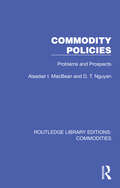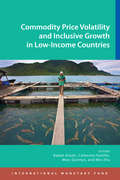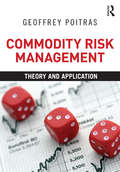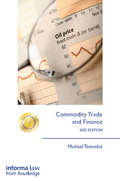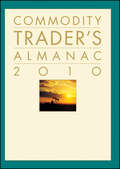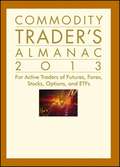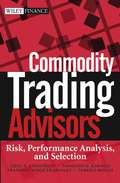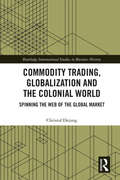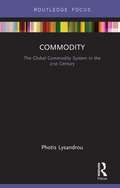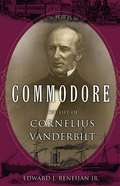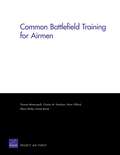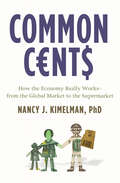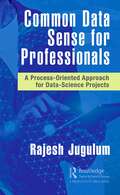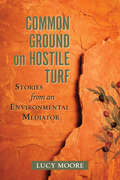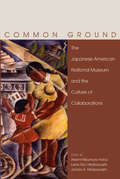- Table View
- List View
Commodity Policies: Problems and Prospects (Routledge Library Editions: Commodities #5)
by Alasdair I. MacBean D. T. NguyenOriginally published in 1987, this book discusses the key issues concerned with primary commodity trade worldwide. Primary commodities are crucially important for many developing countries because very often exports in just one or two primary commodities form the sole source of income for a developing country. Developing countries need above all stability in primary commodities trade to guarantee their future development. This book examines patterns of trade, changing demand and the effects of fluctuations in spot and futures markets. It analyses theories put forward to explain the problems and it reviews the research of the many international organisations which are concerned with the problems. It examines the international agreements and bodies which have been set up to stabilise trade and assesses the performance of these agreements and organisations.
Commodity Price Dynamics: A Structural Approach
by Craig PirrongCommodities have become an important component of many investors' portfolios and the focus of much political controversy over the past decade. This book utilizes structural models to provide a better understanding of how commodities' prices behave and what drives them. It exploits differences across commodities and examines a variety of predictions of the models to identify where they work and where they fail. The findings of the analysis are useful to scholars, traders and policy makers who want to better understand often puzzling – and extreme – movements in the prices of commodities from aluminium to oil to soybeans to zinc.
Commodity Price Volatility and Inclusive Growth in Low-Income Countries
by Marc Quintyn Catherine Pattillo Rabah Arezki Min ZhuIn the years following the global financial crisis, many low-income countries experienced rapid recovery and strong economic growth. However, many are now facing enormous difficulties because of rapidly rising food and fuel prices, with the threat of millions of people being pushed into poverty around the globe. The risk of continued food price volatility is a systemic challenge, and a failure in one country has been shown to have a profound impact on entire regions. This volume addresses the challenges of commodity price volatility for low-income countries and explores some macroeconomic policy options for responding to commodity price shocks. The book then looks at inclusive growth policies to address inequality in commodity-exporting countries, particularly natural resource rich countries. Perspectives from the Middle East and North Africa, sub-Saharan Africa, emerging Asia, and Mexico are presented and, finally, the role of the international donor community is examined. This volume is a must read for policymakers everywhere, from those in advanced, donor countries to those in countries with the poorest and most vulnerable populations.
Commodity Price Volatility, Cyclical Fluctuations, and Convergence: What is Ahead for Inflation in Emerging Europe?
by Edda ZoliA report from the International Monetary Fund.
Commodity Prices and Inflation in the Middle East, North Africa, and Central Asia
by Joseph CrowleyA report from the International Monetary Fund.
Commodity Risk Management: Theory and Application
by Geoffrey PoitrasCommodity Risk Management goes beyond just an introductory treatment of derivative securities, dealing with more advanced topics and approaching the subject matter from a unique perspective. At its core lies the concept that commodity risk management decisions require an in-depth understanding of speculative strategies, and vice versa. The book offers readers a unified treatment of important concepts and techniques that are useful in applying derivative securities in the management of risk in commodity markets. While some of these techniques are well known and fairly common, Poitras offers applications to specific situations and links to speculative trading strategies - extensions of the material that not only are hard to come by, but helpful to both the academic and the practitioner. The book is divided into three parts. The first part deals with the general framework for commodity risk management, the second part focuses on the use of derivative security contracts in commodity risk management, and the third part deals with applications to three specific situations. As a textbook, this book is designed to appeal to classes at a senior undergraduate/MBA/MA levelof training in Finance, financial economics, actuarial science, management science, agriculturaleconomics and accounting. There will also be interest for the book as: a monograph for research libraries, a handbook for individuals working in the commodity risk management industry, and a guidebook for those in the general public interested in topics like farm risk management or the assessment of hedging practices of publicly-traded commodity producers.
Commodity Terms of Trade: The History of Booms and Busts
by Irina Tytell Nikola SpataforaA report from the International Monetary Fund.
Commodity Trade and Finance (The Grammenos Library)
by Michael TamvakisWhat affects the supply of oil? How important is the weather in determining grain prices? Why has the price of copper skyrocketed? This unique book analyses the economics of key commodity groups, including energy, agriculture and metals. It examines the supply/demand fundamentals of several major and minor commodities, physical characteristics, production and consumption patterns, trade flows and pricing mechanisms. It also explains the main tools used to hedge price risk, such as futures, options and swaps. This second edition has been fully revised and restructured, and contains four new chapters, including oil refining, electricity and price risk management for energy, metals and agricultural commodities This book is an indispensable reference text for students, academics and those working in the commodity business.
Commodity Trader's Almanac 2010
by Hirsch John L. PersonAn indispensable resource for active traders from the Hirsch Organization and John Person. Provides the best in investment data and statistics, in the same calendar format as the trusted annual Stock Trader's Almanac. The Commodity Trader’s Almanac 2010 is your annual guide to commodities trading. Whether you’re a seasoned investor or just getting started in commodities this vital desk reference is packed with critical commodity trading seasonality trends, strategies and data for every active trader. You get actionable information on specific stocks, ETFs and more! The 2010 edition's key features include: A NEW Commodity Seasonality Strategy Calendar EXPANDED advice on using the COT Report – Commodity Traders’ "Inside Scoop" BRAND NEW listing of Commodity Trading Specs and Related Securities to Trade Updates on Commodity Seasonalities New Trades and Added Data including the S&P 500 and 30-year Bond Futures Case studies on how these trades actually worked last year Business Cycle Analysis and trading tips for the current climate Expanded Feature on Timing Tools with tips on utilizing Candlesticks and Pivot Points to better time seasonal trades ...and more.
Commodity Trader's Almanac 2011
by Hirsch John L. PersonAn indispensable resource for today's commodity and currency traderThe 2011 Edition of the Commodity Trader's Almanac, is an essential tool for professional traders, and can help you understand the complex and exciting world of commodities and foreign currencies.Created in a similar fashion to the Stock Trader's Almanac-which has been trusted for over 40 years by traders and investors-the Commodity Trader's Almanac is a comprehensive guide featuring monthly strategies, patterns, trends, and trading techniques geared towards active investors of the major commodities and currencies, as well as ETFs, futures, and options.Helps you understand how commodity pricing works and offers great insight into investing in themAlerts you to little-known market patterns and tendencies to help forecast commodity market trends with accuracy and confidenceContains market highlights that cover key supply, demand, and seasonal tendencies on markets including crude oil, ethanol, and precious metals; critical agricultural products such as corn, wheat, and cattle; and foreign currenciesIntended for active traders and investors interested in making the most out of today's commodity, ETF, futures, options, and currencies resources, this guide will help you make more informed decisions as you look for greater profits in this arena.
Commodity Trading Advisors
by Greg N. Gregoriou Vassilios Karavas Fabrice D. Rouah François-Serge LhabitantAuthoritative, up-to-date research and analysis that provides a dramatic new understanding of the rewards-and risks-of investing in CTAsCommodity Trading Advisors (CTAs) are an increasingly popular and potentially profitable investment alternative for institutional investors and high-net-worth individuals. Commodity Trading Advisors is one of the first books to study their performance in detail and analyze the "survivorship bias" present in CTA performance data. This book investigates the many benefits and risks associated with CTAs, examining the risk/return characteristics of a number of different strategies deployed by CTAs from a sophisticated investor's perspective. A contributed work, its editors and contributing authors are among today's leading voices on the topic of commodity trading advisors and a veritable "Who's Who" in hedge fund and CTA research.Greg N. Gregoriou (Plattsburgh, NY) is a Visiting Assistant Professor of Finance and Research Coordinator in the School of Business and Economics at the State University of New York. Vassilios N. Karavas (Amherst, MA) is Director of Research at Schneeweis Partners. Francois-Serge Lhabitant (Coppet, Switzerland) is a FAME Research Fellow, and a Professor of Finance at EDHEC (France) and at HEC University of Lausanne (Switzerland). Fabrice Rouah (Montreal, Quebec) is Institut de Finance Math?matique de Montr?al Scholar in the finance program at McGill University.
Commodity Trading, Globalization and the Colonial World: Spinning the Web of the Global Market (Routledge International Studies in Business History)
by Christof DejungCommodity Trading, Globalization and the Colonial World: Spinning the Web of the Global Market provides a new perspective on economic globalization in the nineteenth and twentieth centuries. Instead of understanding the emergence of global markets as a mere result of supply and demand or as the effect of imperial politics, this book focuses on a global trading firm as an exemplary case of the actors responsible for conducting economic transactions in a multicultural business world. The study focuses on the Swiss merchant house Volkart Bros., which was one of the most important trading houses in British India after the late nineteenth century and became one of the biggest cotton and coffee traders in the world after decolonization. The book examines the following questions: How could European merchants establish business contacts with members of the mercantile elite from India, China or Latin America? What role did a shared mercantile culture play for establishing relations of trust? How did global business change with the construction of telegraph lines and railways and the development of economic institutions such as merchant banks and commodity exchanges? And what was the connection between the business interests of transnationally operating capitalists and the territorial aspirations of national and imperial governments? Based on a five-year-long research endeavor and the examination of 24 public and private archives in seven countries and on three continents, Commodity Trading, Globalization and the Colonial World: Spinning the Web of the Global Market goes well beyond a mere company history as it highlights the relationship between multinationally operating firms and colonial governments, and the role of business culture in establishing notions of trust, both within the firm and between economic actors in different parts of the world. It thus provides a cutting-edge history of globalization from a micro-perspective. Following an actor-theoretical perspective, the book maintains that the global market that came into being in the nineteenth century can be perceived as the consequence of the interaction of various actors. Merchants, peasants, colonial bureaucrats and industrialists were all involved in spinning the individual threads of this commercial web. By connecting established approaches from business history with recent scholarship in the fields of global and colonial history, Commodity Trading, Globalization and the Colonial World: Spinning the Web of the Global Market offers a new perspective on the emergence of global enterprise and provides an important addition to the history of imperialism and economic globalization.
Commodity: The Global Commodity System in the 21st Century (Routledge Frontiers of Political Economy)
by Photis LysandrouThe 21st century marks a watershed in the history of the human economic condition. Income and wealth inequalities are now greater than ever before – and their role in the global financial crisis is one of the burning issues of today. Commodity looks at the great financial crisis from an entirely original perspective – that of the global commodity system as a newly operational totality. In the 19th century, the commodity system as defined by Karl Marx was limited to a few regions and embraced only the labour and capital capacities and their outputs. By the end of the 20th century, it encompassed the entire planet and embraced government capacity as well as private capacities, financial securities and material goods and services. This book shows how the financial crisis and its causes can only properly be understood as a result of this vast, unprecedented extension of the commodity system – a system which benefits the rich. The author makes the watertight case that it is only through the creation of a global tax authority – to coordinate national tax regimes and to implement a tax on global wealth – that we can avoid another crisis and create a fairer and more equitable world. Addressing a broad range of themes, Commodity offers a new perspective which will be of interest to political economists as well as researchers specialising in other related fields of social enquiry. Written in a clear and engaging way, the book’s concise nature also makes it accessible for the non-specialist reader, and it will especially appeal to all those who want a more just society.
Commodore: The Life of Cornelius Vanderbilt
by Edward J. Renehan JrArmed with a trove of previously unreleased archives, Edward J. Renehan Jr. offers a compelling portrait of Cornelius Vanderbilt, who built large shipping and rail enterprises into cornerstones of the American economy, and amassed one of the greatest fortunes the world has ever known. This is the definitive biography of a man whose influence on American business was unsurpassed in his day--or any other.
Common Agricultural Policy and the Future of French Farming
by Gunnar Trumbull Elena Corsi Vincent DessainPresents the history and evolution of the EU Common Agricultural Policy, from early price supports to the 2003 decision to "decouple" payments to European farmers. Explores the logic behind agricultural supports, with a focus on the economic, political, and cultural context of French farming. Discusses efforts to reform the CAP in the context of the Doha Round of WTO negotiations against the backdrop of European enlargement.
Common Battlefield Training for Airmen
by Aimee Bower Thomas Manacapilli Brian Gifford Alexis Bailey Chaitra M. HardisonAir Force members who do not routinely cross a defended perimeter when deployed may not have received sufficient training for doing so when they need to. The authors conducted surveys and interviews to determine the kinds of experiences airmen have had "outside the wire," worked with subject-matter experts to categorize them and suggest training levels, and developed a series of recommendations for course content and further areas for study.
Common Cents: How the Economy Really Works--from the Global Market to the Supermarket
by Nancy J. KimelmanCommon Cents gives average Americans the fundamental knowledge they need to make smart decisions on family finances, investments, jobs, even health care and outsourcing. It brings into focus the hot-button economic, social, and political issues that dominate the front pages of newspapers—especially during this election season. You won’t find get-rich-quick schemes or insider tips on the stock market here; instead, Dr. Nancy J. Kimelman addresses the most pressing questions of our time (such as oil and immigration) and shows you how to raise your economic IQ so you can enjoy a more comfortable, assured, and intelligent life. With her guidance, you’ll argue better, vote better, and—with your newfound financial security—even sleep better.
Common Data Sense for Professionals: A Process-Oriented Approach for Data-Science Projects
by Rajesh JugulumData is an intrinsic part of our daily lives. Everything we do is a data point. Many of these data points are recorded with the intent to help us lead more efficient lives. We have apps that track our workouts, sleep, food intake, and personal finance. We use the data to make changes to our lives based on goals we have set for ourselves. Businesses use vast collections of data to determine strategy and marketing. Data scientists take data, analyze it, and create models to help solve problems. You may have heard of companies having data management teams or chief information officers (CIOs) or chief data officers (CDOs), etc. They are all people who work with data, but their function is more related to vetting data and preparing it for use by data scientists. The jump from personal data usage for self-betterment to mass data analysis for business process improvement often feels bigger to us than it is. In turn, we often think big data analysis requires tools held only by advanced degree holders. Although advanced degrees are certainly valuable, this book illustrates how it is not a requirement to adequately run a data science project. Because we are all already data users, with some simple strategies and exposure to basic analytical software programs, anyone who has the proper tools and determination can solve data science problems. The process presented in this book will help empower individuals to work on and solve data-related challenges. The goal of this book is to provide a step-by-step guide to the data science process so that you can feel confident in leading your own data science project. To aid with clarity and understanding, the author presents a fictional restaurant chain to use as a case study, illustrating how the various topics discussed can be applied. Essentially, this book helps traditional businesspeople solve data-related problems on their own without any hesitation or fear. The powerful methods are presented in the form of conversations, examples, and case studies. The conversational style is engaging and provides clarity.
Common Data Sense for Professionals: A Process-Oriented Approach for Data-Science Projects
by Rajesh JugulumData is an intrinsic part of our daily lives. Everything we do is a data point. Many of these data points are recorded with the intent to help us lead more efficient lives. We have apps that track our workouts, sleep, food intake, and personal finance. We use the data to make changes to our lives based on goals we have set for ourselves. Businesses use vast collections of data to determine strategy and marketing. Data scientists take data, analyze it, and create models to help solve problems. You may have heard of companies having data management teams or chief information officers (CIOs) or chief data officers (CDOs), etc. They are all people who work with data, but their function is more related to vetting data and preparing it for use by data scientists. The jump from personal data usage for self-betterment to mass data analysis for business process improvement often feels bigger to us than it is. In turn, we often think big data analysis requires tools held only by advanced degree holders. Although advanced degrees are certainly valuable, this book illustrates how it is not a requirement to adequately run a data science project. Because we are all already data users, with some simple strategies and exposure to basic analytical software programs, anyone who has the proper tools and determination can solve data science problems. The process presented in this book will help empower individuals to work on and solve data-related challenges. The goal of this book is to provide a step-by-step guide to the data science process so that you can feel confident in leading your own data science project. To aid with clarity and understanding, the author presents a fictional restaurant chain to use as a case study, illustrating how the various topics discussed can be applied. Essentially, this book helps traditional businesspeople solve data-related problems on their own without any hesitation or fear. The powerful methods are presented in the form of conversations, examples, and case studies. The conversational style is engaging and provides clarity.
Common Fund Hedge Fund Portfolio
by Andre F. Perold William T. SpitzThe Common Fund, a nonprofit consortium of educational institutions, is deciding whether to create a fund of hedge funds for its members, and if it does, which hedge fund managers to select.
Common Ground on Hostile Turf: Stories from an Environmental Mediator
by Lucy MooreIn our increasingly polarized society, there are constant calls for compromise, for coming together. For many, these are empty talking points--for Lucy Moore, they are a life's work. As an environmental mediator, she has spent the past quarter century resolving conflicts that appeared utterly intractable. Here, she shares the most compelling stories of her career, offering insight and inspiration to anyone caught in a seemingly hopeless dispute. Moore has worked on wide-ranging issues--from radioactive waste storage to loss of traditional grazing lands. More importantly, she has worked with diverse groups and individuals: ranchers, environmental activists, government agencies, corporations, tribal groups, and many more. After decades spent at the negotiating table, she has learned that a case does not turn on facts, legal merit, or moral superiority. It turns on people. Through ten memorable stories, she shows how issues of culture, personality, history, and power affect negotiations. And she illustrates that equitable solutions depend on a healthy group dynamic. Both the mediator and opposing parties must be honest, vulnerable, open, and respectful. Easier said than done, but Moore proves that subtle shifts can break the logjam and reconcile even the most fiercely warring factions. This book should be especially appealing to anyone concerned with environmental conflicts; and also to students in environmental studies, political science, and conflict resolution, and to academics and professionals in mediation and conflict resolution fields.
Common Ground: The Japanese American National Museum and the Culture of Collaborations
by Lane Ryo Hirabayashi Akemi Kikumura-Yano James A. HirabayashiLos Angeles's Japanese American National Museum, established in 1992, remains the only museum in the United States expressly dedicated to sharing the story of Americans of Japanese ancestry. The National Museum is a unique institution that operates in collaboration with other institutions, museums, researchers, audiences, and funders. In this collection of seventeen essays, anthropologists, art historians, museum curators, writers, designers, and historians provide case studies exploring collaboration with community-oriented partners in order to document, interpret, and present their histories and experiences and provide a new understanding of what museums can and should be in the United States. Current scholarship in museum studies is generally limited to interpretations by scholars and curators. Common Ground brings descriptive data to the intellectual canon and illustrates how museum institutions must be transformed and recreated to suit the needs of the twenty-first century.
Common Legal Framework for Takeover Bids in Europe
by Dirk Van GervenThe Council Directive of 21 April 2004 on takeover bids sets forth the general principles applicable to takeover bids and clarifies certain minimum rules with respect to the procedure for a takeover bid, the obligation to make a mandatory bid in the event a minimum threshold is crossed and the majority shareholder's squeeze-out right as well as the minority shareholders' sell-out right. Furthermore, the Directive defines the authority which is competent to approve offer documents and supervise takeover bids, and provides for optional restrictions on the actions of the target company's management and on defence mechanisms. This book discusses the Takeover Directive and its implementing rules in each Member State of the European Union and the European Economic Area, providing companies and their advisors with useful insight into the legal framework and principles applicable to takeover bids in the region.
Common Pool Resources: Strategic Behavior, Inefficiencies, and Incomplete Information
by Felix Muñoz-Garcia Ana Espinola-ArredondoCommon Pool Resources include, for instance, fishing grounds, irrigation systems, forests and the atmosphere. Now more than ever, how we responsibly share and use those goods is a vital issue. This textbook introduces students of economics, business and policy studies to the key issues in the field. It uses a game-theory approach to help readers understand the mathematical representation of how to find equilibrium behavior in CPRs, how to identify the socially optimal appropriation, and how to measure the inefficiencies that arise. Algebra and calculus steps are clearly explained, so students can more easily reproduce the analysis and apply it in their own research. Finally, the book also summarizes experimental studies that tested theoretical results in controlled environments, introducing readers to a literature that has expanded over the last decades, and provides references for further reading.
Common Pools of Genetic Resources: Equity and Innovation in International Biodiversity Law (Routledge Research in International Environmental Law)
by Gerd Winter Evanson Chege KamauThe Convention on Biological Diversity (CBD) strives for the sustainable and equitable utilization of genetic resources, with the ultimate goal of conserving biodiversity. The CBD and the Nagoya Protocol which has since been elaborated suggest a bilateral model for access to genetic resources and the sharing of benefits from their utilization. There is concern that the bilateral exchange "genetic resource for benefit sharing" could have disappointing results because providers are left out of the process of research and development, benefits are difficult to be traced to sources, and providers owning the same resource may complain of being excluded from benefit sharing. Thus, the CBD objective of full utilization and equitability may become flawed. Common Pools of Genetic Resources: Equity and Innovation in International Biodiversity Law suggests common pools as a complementary approach to bilateralism. This is one of the first books to reply to a number of complex legal questions related to the interpretation and implementation of the Nagoya Protocol. Taking an inductive approach, it describes existing pools and analyzes how they are organized and how they perform in terms of joint R&D and benefit sharing. It presents case studies of the most characteristic types of common pools, provides suggestions for further developing existing pools to cope with the requirements of the CBD and NP and, at the same time uses the clauses these conventions contain to open up for commons approaches. Written by a team of expert academics and practitioners in the field, this innovative book makes a timely and valuable contribution to academic and policy debates in international environmental law, international biodiversity law, intellectual property law, climate law and the law of indigenous populations.
